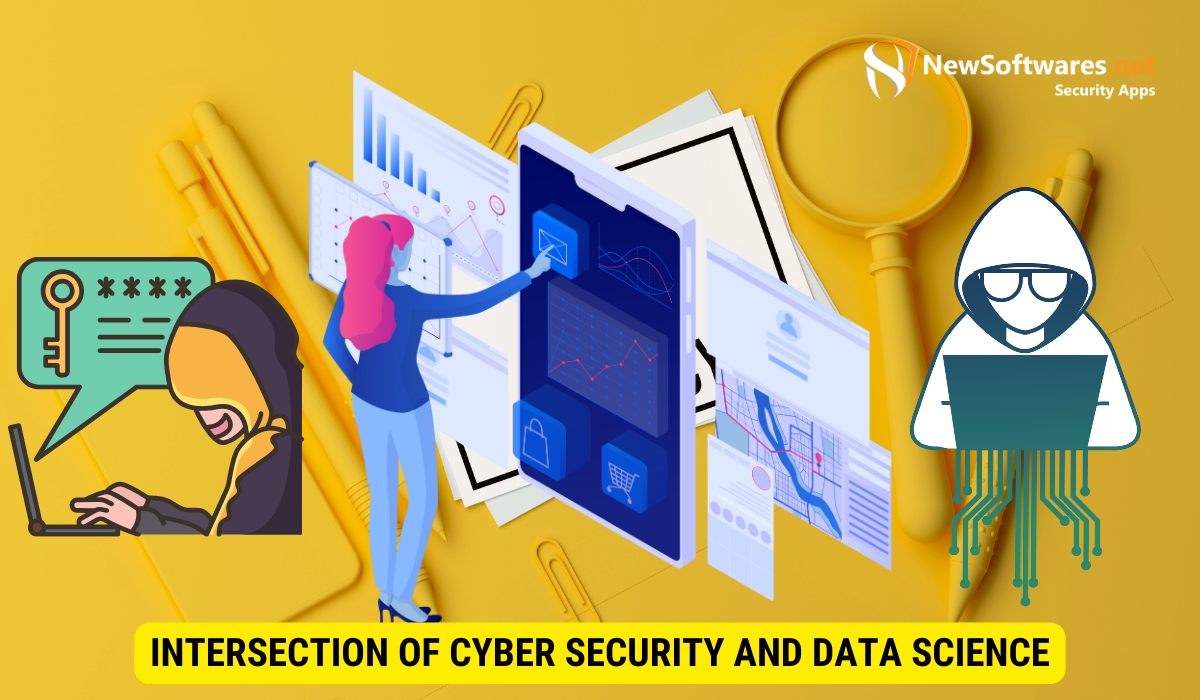Cyber security and data science are interconnected fields, with data science techniques aiding in identifying cyber threats and robust cyber security measures ensuring data integrity and privacy for data science projects.
In today’s interconnected world, where data has become the lifeblood of organizations, the importance of cyber security cannot be overstated. Cyber security is dedicated to protecting computer system, networks, and data from unauthorized access, theft, and damage. On the other hand, data science is a multidisciplinary field that use scientific method, processes, algorithms, and systems to take out valuable insights and knowledge from large volumes of data. At first glance, these two fields may seem unrelated, but a closer look reveals the significant overlap and interdependency between cyber security and data science.
Understanding the Basics of Cyber Security

Before delving into the relationship between cyber security and data science, let’s first understand the basics of cyber security. Cyber security encompasses various practices and technologies to safeguard computing devices, networks, and data from cyber threats. Threats include hacking, malware, phishing, & social engineering. The main goal of cyber security is to make sure the privacy, integrity, and availability of data and resources, thereby protecting individuals, organizations, and even nations from cyber attacks.
Defining Cyber Security
Cyber security involves various activities and measures aimed at securing systems and data. It includes implementing strong authentication mechanisms, establishing robust access controls, encrypting data, conducting regular vulnerability assessments, and developing incident response plans. Additionally, cyber security professionals are responsible for staying updated on the threats, vulnerabilities and developing and implementing countermeasures to mitigate risks.
Key Elements of Cyber Security
Several key elements form the foundation of cyber security:
- Confidentiality: This ensure that only authorized individuals have access to sensitive information.
- Integrity: This focuses on preventing unauthorized modification or tampering of data.
- Availability: This ensures that systems and data are accessible to authorized users when needed.
- Authentication: This verifies the identity of users to prevent unauthorized access.
- Authorization: This determines the level of access that authenticated users have to systems and data.
- Audit: This involves monitoring and logging activities to detect and investigate suspicious behavior.
The Role of Data Science in Today’s World
In today’s data-driven world, data science is vital in helping organizations make informed decisions, gain competitive advantages, and drive innovation. Data science involves collecting, preparing, analyzing, and interpreting large volumes of data to expose patterns, extract insights, and make predictions. It combines techniques from various fields, such as statistics, mathematics, computer science, and domain knowledge, to extract actionable information from complex data sets.
What is Data Science?
Data science encompass the entire data lifecycle, from data collection and cleansing to data analysis and visualization. It involves using programming languages like Python and R and advanced statistical and machine learning techniques. Data scientists use tools and technologies to manipulate, process, and analyze data, such as data mining, predictive modeling, and natural language processing.
The Importance of Data Science
Data science has become increasingly important in various industries and sectors. It helps organizations discover patterns and correlations in data, which can be used to drive business strategies, optimize operations, and enhance customer experiences. Data science enables organizations to gain insights from large and complex data sets that were previously unmanageable, opening up new opportunities for growth and innovation.
Intersection of Cyber Security and Data Science

Now that we clearly understand cyber security and data science let’s explore how these two fields intersect and complement each other.
How Data Science is Used in Cyber Security?
Data science techniques and methodologies are increasingly used in cyber security to identify, prevent, and respond to evolving threats. Machine learning algorithms can examine huge amount of data to detect patterns and anomalies that may show potential cyber-attacks. By continuously monitoring network traffic, data scientists can develop models that automatically identify suspicious activities and alert cyber security professionals.
Data science can also be applied to predict vulnerabilities in computer systems. By analyzing historical data on software vulnerabilities and patches, data scientists can develop models that predict the likelihood of future vulnerabilities and proactively address potential risks.
Additionally, data science can play a significant role in incident response. Data scientists can identify common patterns and develop predictive models to determine the most effective response strategies by analyzing data from past cyber attacks. This can help organization reduce the impact of a cyber attack and recover more quickly.
The Impact of Cyber Security on Data Science
Cyber security is crucial for ensuring the integrity and validity of data used in data science projects. Data breaches and illegal access can compromise the quality and accuracy of data, leading to skewed analysis and misleading insights. Therefore, robust cyber security measures are essential to establish trust in the data used for data science applications.
Cyber security also significantly protects intellectual property and sensitive data vital to data science projects. Organizations must ensure that data in data science initiatives are properly anonymized, encrypted, and protected from unauthorized access to maintain privacy and prevent data leakage.
The Future of Cyber Security and Data Science
The intersection of cyber security & data science holds immense potential for the future. As organizations persist to rely on data to drive decision-making processes, the need for robust cybersecurity measures becomes even more critical. Here are a few trends and challenges that we can expect to shape the future of cyber security and data science:
Emerging Trends in Cyber Security and Data Science
One emerging trend is using artificial intelligence (AI) and machine learning (ML) technologies to enhance cyber security. AI and ML algorithms can analyze large volumes of data in real time and automatically detect and respond to cyber threats. These technologies have the prospective to significantly enhance the speed and accuracy of threat revealing and improve overall security posture.
Another trend is the increasing adoption of big data analytics in cyber security. By leveraging big data platforms and technologies like Hadoop and Spark, organizations can process and analyze massive amounts of security-related data to gain actionable insights and enhance their cyber security defenses. Big data analytics can enable organizations to detect sophisticated and advanced threats that traditional security solutions might miss.
Challenges and Opportunities in the Convergence of Cyber Security and Data Science
One of the key challenges in the convergence of cyber security and data science is the shortage of skilled professionals who can effectively bridge these two fields. There is a rising demand for individuals with information and expertise in cyber security and data science, as they can bring a unique perspective and help organizations develop holistic and effective security strategies.
Additionally, the ethical considerations surrounding data science and cyber security must be carefully addressed. Collecting and analyzing large volumes of data raise concerns about privacy, data protection, and potential biases in data-driven decision-making. Balancing the benefits of data science with the need for data privacy and security is an ongoing challenge that requires careful consideration and regulation.
Skills Needed for Cyber Security and Data Science Professionals
Given the intersection of cyber security and data science, professionals in these fields need a combination of technical skills and domain knowledge. Here are some essential skill for cybersecurity professionals:
Essential Skills for Cyber Security Professionals
- Knowledge of networking protocols and systems
- Understanding of security practices and technologies
- Experience with security monitoring and incident response
- Proficiency in vulnerability assessment and penetration testing
- Knowledge of regulatory requirements and compliance standards
Similarly, data scientists in the realm of cyber security require a strong foundation in data science techniques combined with a solid understanding of cyber security concepts. Here are some must-have skills for data scientists:
Must-have Skills for Data Scientists
- Proficiency in programming languages, for example Python or R
- Expertise in statistical study and machine learning algorithms
- Ability to work with large and complex data sets
- Strong problem-solving and analytical skills
- Domain knowledge in cyber security
Key Takeaways
- Cyber security safeguards computer systems and data from unauthorized access and damage, while data science extracts insights from large data volumes.
- Data science techniques, like machine learning, aid cyber security by detecting patterns and anomalies indicative of cyber threats.
- Robust cyber security measures are vital to ensure data integrity, accuracy, and privacy for data science projects.
- The collaboration between cyber security and data science is essential in facing evolving cyber threats and making data-driven decisions.
FAQs
Q: Can data science help detect new and emerging cyber threats?
A: Data science techniques like machine learning can be used to analyze large volumes of data to detect new and emerging cyber threats. By continuously monitoring network traffic and analyzing historical data, data scientists can develop models to recognize patterns and anomalies that may specify potential threats.
Q: How can cyber security benefit from big data analytics?
A: Big data analytics can help cyber security professionals analyze massive amounts of security-related data to gain actionable insights and enhance defense strategies. By leveraging big data platforms and technologies, organizations can detect sophisticated and advanced threats that traditional security solutions might miss.
Q: What are the challenges in combining cyber security and data science?
A: One of the key challenges is the shortage of skilled professionals with knowledge and expertise in cyber security and data science. Additionally, ethical considerations surrounding data privacy, protection, and potential biases in data-driven decision-making must be carefully addressed.
Q: What skills do cyber security professionals need?
A: Cybersecurity professionals need knowledge of networking protocols and systems, an understanding of security practices and technologies, experience with security monitoring and incident response, proficiency in vulnerability assessment, and knowledge of regulatory requirements and compliance standards.
Q: What skills do data scientists need in cyber security?
A: Data scientists in cyber security need proficiency in programming languages for instance Python or R, expertise in statistical analysis & machine learning algorithms, ability to work with large and complex data sets, strong problem-solving and analytical skills, and domain knowledge in cyber security.
Conclusion
Cyber security and data science are interconnected fields that play crucial roles in today’s digital landscape. While cyber security protects computer systems, networks, and data from unauthorized access and damage, data science aims to extract valuable insights and facts from large volumes of data. The intersection of these fields presents numerous opportunities for enhancing cyber security and improving data-driven decision-making processes. As organizations continue to face developing cyber threats and analyze vast amounts of data, the collaboration between cyber security and data science will become increasingly essential for ensuring data integrity, confidentiality, and availability.
